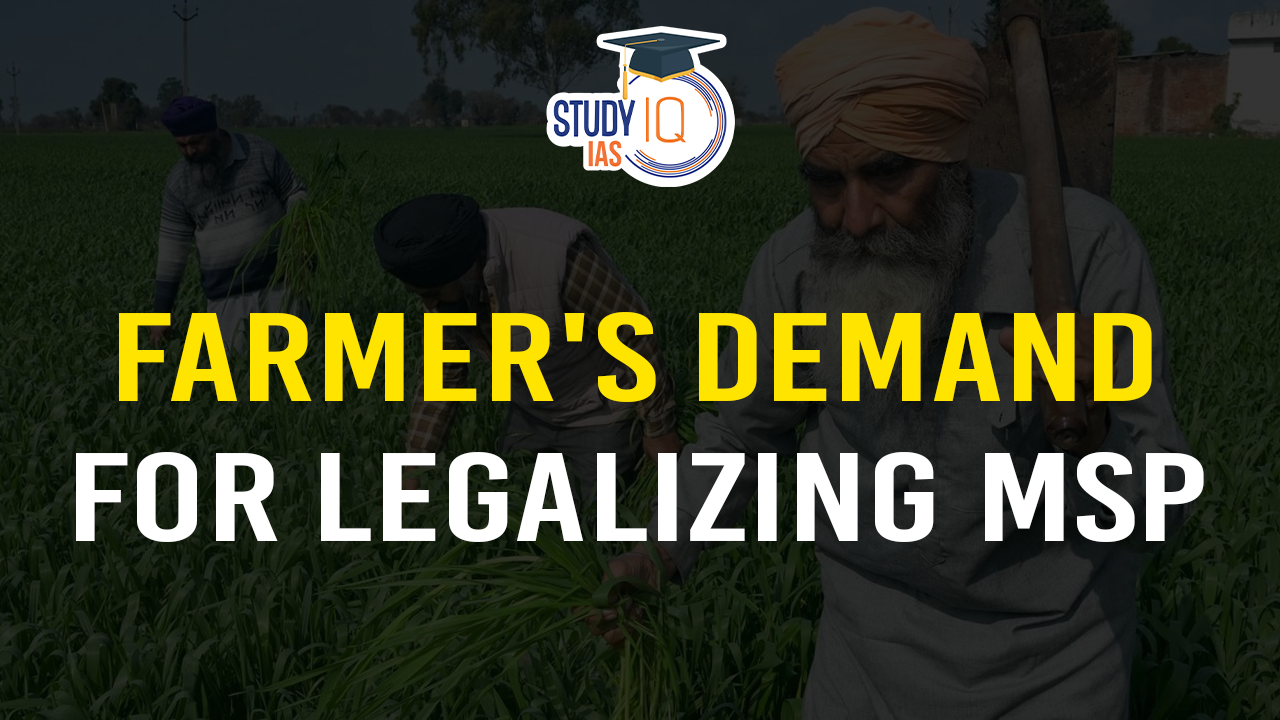Table of Contents
Context: Recently demand for a legal guarantee to minimum support price (MSP) was raised by the agitating farmers in Punjab.
What is the Minimum Support Price?
- The Minimum Support Price (MSP) is the price at which the government commits to buying farmers’ crops if market prices drop below this predetermined level.
- The Government sets the MSP at the start of the sowing season, based on the recommendation of the Commission for Agricultural Costs and Prices (CACP).
Process of Awarding MSP
Recommendation Stage
- Entity Involved: Commission for Agricultural Costs and Prices (CACP)
- Action: Submits annual Price Policy Reports to the government
- Considerations: Production costs, demand-supply dynamics, market trends, inter-crop price relationships
Decision Stage
- Entity Involved: Cabinet Committee on Economic Affairs (CCEA), led by the Prime Minister
- Action: Review and approve MSP levels
- Inputs: CACP’s Price Policy Report, state government opinions, national demand-supply situation
Procurement Stage
- Entity Involved: Food Corporation of India (FCI) and State agencies
- Action: Execute procurement of crops
- Timing: Commences at the start of the planting season.
Need for a Legal MSP
- Mitigating Price Risk: Agriculture is inherently risky due to unpredictable factors like weather, pests, and diseases.
- Price risk, which occurs due to market fluctuations, can be addressed through a legal MSP, ensuring farmers receive a fair price for their produce.
- Encouraging Farmers to Stay in Agriculture: The diversion of fertile agricultural land for non-agricultural purposes and the decline in serious farming households threaten agricultural sustainability.
- A legal MSP can provide a stable income, incentivizing farmers to continue farming instead of selling their land for other uses.
- Boosting Investment in Farming: Assurance of remunerative prices encourages farmers to invest in modern technologies and practices to enhance yields and reduce costs.
- Eg., the Green Revolution was supported by such assurances.
- Promoting Crop Diversification: A legal MSP can encourage farmers to diversify from resource-intensive crops like paddy to sustainable alternatives such as pulses, oilseeds, and maize. This can reduce environmental degradation and water depletion.
- Formalizing and Digitizing Agriculture Trade: A Price Deficiency Payment (PDP) system, as part of a legal MSP framework, would promote formal and digitized trade.
- Farmers would demand receipts for sales, enhancing transparency and efficiency in agricultural transactions.
- Strategic and Food Security Imperatives: India must ensure self-reliance in food production to feed its growing population and reduce dependence on imports.
- A legal MSP would provide the financial stability needed for farmers to sustain and expand their operations.
- Enhancing Farmer-Consumer Equilibrium: Ensuring stable incomes for farmers through MSP aligns with consumer self-interest by maintaining a robust and secure supply chain for food and agricultural products.
Challenges Associated with an MSP Law
- Complex Implementation of Punitive Action: Legal provisions may mandate penalties for transactions below MSP.
- However, enforcing these actions is challenging and could deter buyers from participating in regulated markets during price fluctuations.
- Exclusion of Small and Marginal Farmers: With limited access to regulated markets and low holding capacity, over 80% of smallholders may be forced to sell produce outside these markets, often at lower prices.
- Creation of Black Markets: Fear of punitive measures could lead to unregulated parallel markets, further reducing the transparency and efficiency of agricultural trade.
- Geographical and Infrastructure Gaps: Inadequate density of regulated wholesale markets (one market per 450 sq km vs. the optimal 80 sq km) results in small farmers selling at the farm gate, bypassing MSP entirely.
- Income Risk Beyond Price Risk: MSP laws address price risk but do not secure incomes against other risks like rising costs or fluctuating demand.
- Eg., despite high procurement levels in states like Punjab and Haryana, farmers’ incomes have declined.
- Environmental and Resource Concerns: Over-reliance on MSP for certain crops like wheat and rice has led to environmental degradation, groundwater depletion, and unsustainable farming practices.
Way Forward
- Diversified Support Mechanisms: Adopt a combination of direct income support (e.g., PM-Kisan), price deficiency payments, and limited procurement to safeguard farmer incomes and livelihoods.
- Promote Crop Diversification: Encourage the shift from water-intensive crops like rice to alternatives such as pulses, oilseeds, and millets through incentives and awareness campaigns.
- Enhance Market Infrastructure: Develop village-level markets equipped with regulated storage, standardization, and certification facilities to improve quality and access to better prices.
- Strengthen Warehousing and Financing: Expand regulated warehousing capacity and promote e-Negotiable Warehouse Receipts (eNWR) financing to increase farmers’ holding power and reduce distress sales.
- Reorient Subsidy Policies: Transition from unsustainable subsidies (electricity, fertilizers) to direct financial assistance that aligns with sustainable agricultural practices and reduces environmental harm.
- Strengthen Agricultural Extension: Empower Krishi Vigyan Kendras (KVKs) and block-level agricultural offices to educate farmers about sustainable practices, policy implications, and market opportunities while establishing feedback channels with policymakers.
- Facilitate Direct Market Linkages: Enable partnerships between farmers and processors or other value chain participants to align production with market demand and ensure better returns.


 Utkal Divas 2025: Odisha Foundation Day ...
Utkal Divas 2025: Odisha Foundation Day ...
 List of Military Exercises of India 2024...
List of Military Exercises of India 2024...
 PAC Report on GST Reforms and Recommenda...
PAC Report on GST Reforms and Recommenda...





















